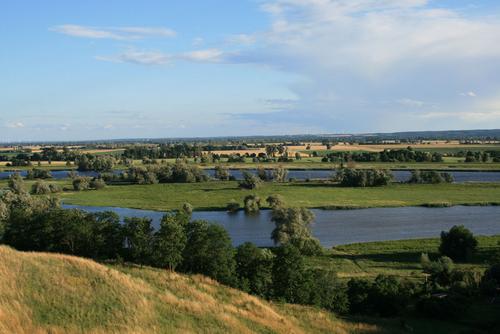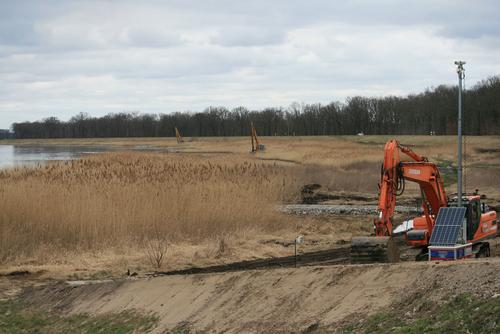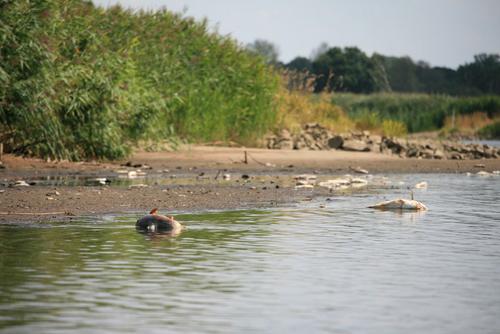++ Government in Warsaw plans to narrow and deepen the German-Polish border river ++ Nature conservation organisations file complaint with EU ++ Environmental disaster last summer already put massive strain on the Oder ++

The Oder is one of the last near-natural rivers in Central Europe. Many rare animal and plant species live in the river or on its banks.
© Sascha Maier/BUND
Already in March 2022, Poland has started with the conversion plans for the Oder. Despite the environmental disaster in the summer, the General Directorate for Environmental Protection in Warsaw is sticking to the plans.
© Sascha Maier/BUND
The die-off of fish in August 2022 was one of the biggest environmental disasters in recent times in Europe. The long-term effects on the ecosystem are not yet foreseeable.
© Sascha Maier/BUNDRadolfzell, Berlin, Warsaw. Since March 2022, the infrastructure measures to convert the Oder into a canal for river traffic have been underway on the Polish bank of the Oder. Despite the environmental catastrophe this summer, which led to massive fish and shellfish mortality, the government in Warsaw is sticking to the planned changes to the border river. The international nature conservation charity EuroNatur, together with the Polish NGO EKO-UNIA, representing the Polish river protection alliance Koalicja Ratujmi Rzeki and the Bund für Umwelt- und Naturschutz Deutschland (BUND), representing the Action Alliance Living Oder river, today filed a complaint with the European Commission against the further destruction of the valuable river ecosystem.
The construction plans violate several European Union directives at once: they are in stark contradiction to the objectives of the European Water Framework Directive and the Flora-Fauna-Habitat Directive. In addition, the Polish authorities have approved the project without carrying out sufficient environmental impact assessments (EIA), which is also a clear violation of EU directives. Although the construction measures are taking place on the Polish side of the river, it can be assumed that German NATURA 2000 sites will also be affected by the measures. This impact was either ignored or given insufficient consideration in the EIA.
The Polish government justifies the conversion plans by citing the need for flood protection. They say that, during winter ice floods, the German-Polish icebreaker fleet needs to have sufficient navigational depth to be able to reach ice barriers behind which the water accumulates. There is much to suggest that this reason is merely a pretext and, in reality, is more about enabling increased inland navigation.
"This summer we have seen exactly what can happen to an overexploited river - and we have seen the effects on both sides of the border“ says Annette Spangenberg, Head of Nature Conservation at EuroNatur. "The massive interventions currently planned by the Polish government will also have a negative impact on the German side, especially since no measures have been taken to prevent or compensate for these impacts. In addition, essential sections of the EIA were not translated into German, making it almost impossible for the German side to comment on the Polish projects. So there are many reasons for German organisations to support this complaint in order to preserve the common Polish-German natural heritage," says Spangenberg.
Radosław Gawlik from EKO-UNIA says: „Since 2016, we have been complaining about the canalization of the Oder to the European Commmission and World Bank, both of which contribute to financing the measures. The disaster in the summer has proved that we are right: it is now not only NGOs, but all major Polish and German scientists who are demanding that a stop be put to the conversion of the still wild, free-flowing Oder into a navigable canal. Improving the river means restoring, not regulating its ecosystem! “
"The ecological catastrophe on the Oder is a dramatic wake-up call: the EU mandate to restore our waters to a healthy ecological state must be implemented urgently and with great vigour," explains Olaf Bandt, Chairman of BUND. "For the Oder, we demand an immediate stop to this project. We call on the European Commission to do its utmost to achieve this in an exchange with the Polish government and to immediately stop the use of EU funds for the Oder canalisation."
Background information:
- EuroNatur, EKO-UNIA and BUND have submitted the complaint to the European Commission on behalf of the German Action Alliance Living Oder and the Polish Alliance KRR (Koalicja Ratujmy Rzeki). Other supporters are Fundacja EkoRozwoju, Fundacja WWF Poland, Greenmind Foundation, Ogólnopolskie Towarzystwo Ochrony Ptaków, Stepnicka Organizacja Turystyczna, Deutscher Naturschutzring, Deutsche Umwelthilfe e.V., Heinz-Sielmann-Stiftung, NABU Germany, WWF Deutschland and Arnika.
- The Oder is one of the last large, near-natural rivers in Europe. It is the only major central European river to have been spared transverse structures (e.g. barrages) for more than 500 kilometres upstream from its mouth. Surrounded by softwood floodplain forests, the river has been an important habitat for endangered and protected species. However, German-Polish plans to regulate the river and deepen the navigation channel are putting the Oder and its ecosystem under increasing pressure.
- In August of this year, an environmental disaster on the Oder hit the headlines. Increased salinity in combination with excessively high temperatures and too little oxygen led to a dramatic die-off of fish, molluscs and other river life. To this day, the causes of the catastrophe have not been fully explained. Hydrobiologists warn that the decomposed organic material now lying at the bottom of the Oder will be released again in spring when temperatures rise. Another environmental disaster on the Oder could thus be on the cards.
Enquiries:
Christian Stielow, EuroNatur, christian.stielow(at)euronatur.org, Tel.: +49 (0)7732 - 92 72 15
Radosław Gawlik, Stowarzyszenie Ekologiczne EKO-UNIA, rgawlik(at)eko.org.pl, Tel.: +48 605 037 417
Sascha Maier, BUND, sascha.maier(at)bund.net, Tel.: + 49 30 275 86-532
Select on which of your areas of interest you would like to receive our press releases.
You can subscribe to our RSS feeds to receive all the news on the topics of your choice.


